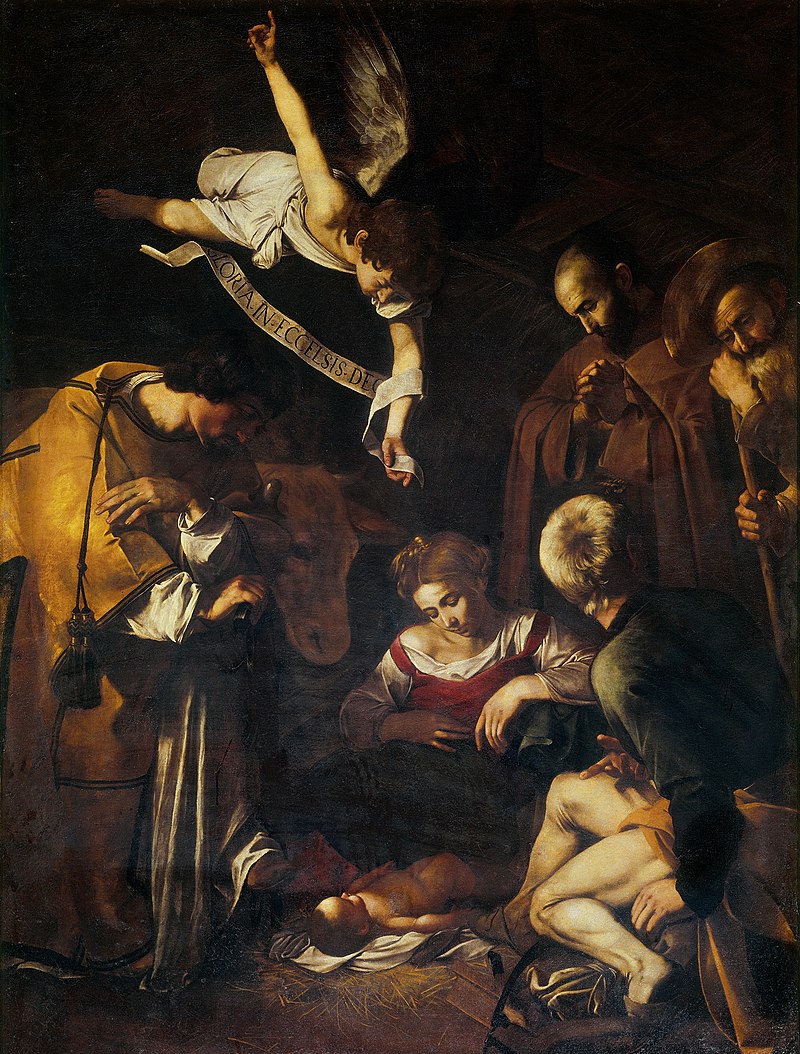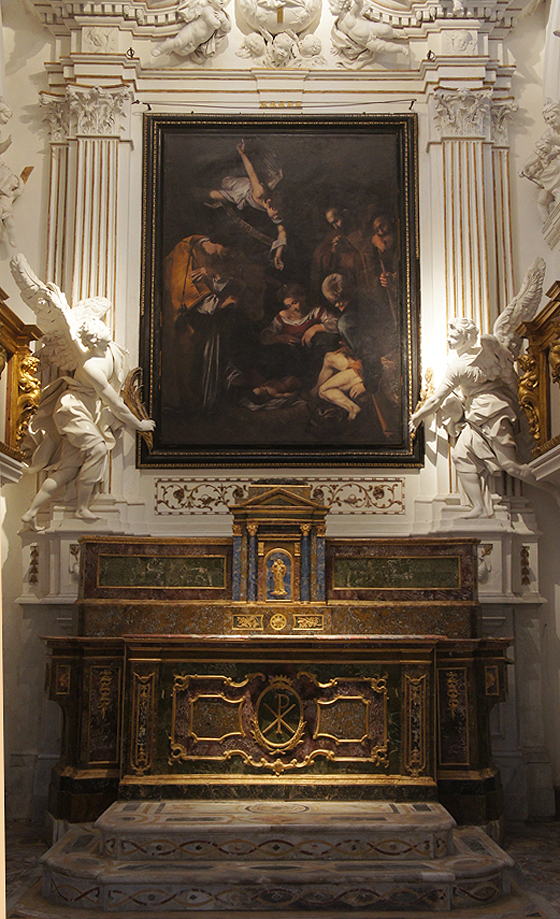Through the Virgin Birth, Jesus Christ became operative in human history without being subject to the evil in it. And the Word was made flesh, And came to dwell among us; And we had sight of His glory, Glory such as belongs to The Father’s only-begotten Son, Full of grace and truth. (Jn 1:14)
Bethlehem became a link between heaven and earth; God and man met here and looked each other in the face. In the taking of human flesh, the Father prepared it, the Spirit formed it, and the Son assumed it. He Who had an eternal generation in the bosom of the Father now had a temporal generation in time. He Who had His birth in Bethlehem came to be born in the hearts of men.
For, what would it profit if He was born a thousand times in Bethlehem unless He was born again in man? But all those who did welcome Him, He empowered to become the children of God. (Jn 1:12)
Now man need not hide from God as Adam did; for He can be seen through Christ’s human nature. Christ did not gain one perfection more by becoming man, nor did He lose anything of what He possessed as God. There was the Almightiness of God in the movement of His arm, the Infinite Love of God in the beatings of His human heart and the Unmeasured Compassion of God to sinners in His eyes.
God is now manifest in the flesh; this is what is called the Incarnation. The whole range of the Divine attributes of power and goodness, justice, love, beauty, were in Him. And when Our Divine Lord acted and spoke, God in His perfect nature became manifest to those who saw Him and heard Him and touched Him. As He told Philip later on: Whoever has seen Me has seen the Father. (Jn. 14:9)
No man can love anything unless he can get his arms around it, and the cosmos is too big and too bulky. But once God became a Babe and was wrapped in swaddling clothes and laid in a manger, men could say, “This is Emmanuel, this is God with us.” By His reaching down to frail human nature and lifting it up to the incomparable prerogative of union with Himself, human nature became dignified.
So real was this union that all of His acts and words, all of His agonies and tears, all of His thoughts and reasonings, resolves and emotions, while being properly human, were at the same time the acts and words, agonies and tears, thoughts and reasonings, resolves and emotions of the Eternal Son of God.
What men call the Incarnation is but the union of two natures, the Divine and the human in a single Person Who governs both. This is not difficult to understand; for what is man but a sample, at an immeasurably lower level, of a union of two totally different substances, one material and the other immaterial, one the body, the other the soul, under the regency of a single human personality?
What is more remote from one another than powers and capacities of flesh and spirit? Antecedent to their unity, how difficult it would be ever to conceive of a moment when body and soul would be united in a single personality. That they are so united is an experience clear to every mortal. And yet it is an experience at which man does not marvel because of its familiarity.
God, Who brings together body and soul into one human personality, notwithstanding their difference of nature, could surely bring about the union of a human body and a human soul with His Divinity under the control of His Eternal Person. This is what is meant by the And the Word was made flesh, And came to dwell among us. (Jn. 1:14) The Person which assumed human nature was not created, as is the case of all other persons. His Person was the pre-existent Word or Logos.
His human nature, on the other hand, was derived from the miraculous conception by Mary, in which the Divine overshadowing of the Spirit and the human Fiat or the consent of a woman, were most beautifully blended. This is the beginning of a new humanity out of the material of the fallen race.
When the Word became flesh, it did not mean that any change took place in the Divine Word. The Word of God proceeding forth did not leave the Father’s side. What happened was not so much the conversion of the Godhead into flesh, as the taking of a manhood into God. There was continuity with the fallen race of man through the manhood taken from Mary; there is discontinuity through the fact that the Person of Christ is the pre-existent Logos.
Christ thus literally becomes the second Adam, the Man through whom the human race starts all over. His teaching centered on the incorporation of human natures to Him, after the manner in which the human nature that He took from Mary was united to the Eternal Word.

It is hard for a human being to understand the humility that was involved in the Word becoming flesh. Imagine, if it were possible, a human person divesting himself of his body, and then sending his soul into the body of a serpent. A double humiliation would follow: first, accepting the limitations of a serpentine organism, knowing all the while his mind was superior, and that fangs could not adequately articulate thoughts no serpent ever possessed. The second humiliation would be to be forced as a result of this “emptying of self” to live in the companionship of serpents.
But all this is nothing compared to the emptying of God, by which He took on the form of man and accepted the limitations of humanity, such as hunger and persecution; not trivial either was it for the Wisdom of God to condemn Himself to association with poor fishermen who knew so little.
But this humiliation which began in Bethlehem when He was conceived in the Virgin Mary was only the first of many to counteract the pride of man, until the final humiliation of death on the Cross. If there were no Cross, there would have been no crib; if there had been no nails, there would have been no straw.
But He could not teach the lesson of the Cross as payment for sin; He had to take it. God the Father did not spare His Son – so much did He love mankind. That was the secret wrapped in the swaddling bands.
The name “Jesus” was a fairly common one among the Jews. In the original Hebrew, it was “Josue.” The angel told Joseph that Mary would: Bear a son, whom thou shalt call Jesus, For He is to save His people from their sins. (Mt. 1:21) This first indication of the nature of His mission on earth does not mention His teaching; for the teaching would be ineffective, unless there was first salvation.
He was given another name at the same time, the name “Emmanuel.” Behold, the virgin shall be with child, And shall bear a son, And they shall call Him Emmanuel, (which means God with us). (Mt. 1:23) This name was taken from the prophecy of Isaias and it assured something besides a Divine presence; together with the name “Jesus,” it meant a Divine presence which delivers and saves.
The angel also told Mary: And behold, thou shalt conceive in thy womb, And shalt bear a son, and shalt call Him Jesus. He shall be great, and men will know Him for the Son of the Most High; The Lord God will give Him the throne of His Father David, And He shall reign over the house of Jacob eternally; His kingdom shall never have an end. (Lk. 1:31–33)
The title “Son of the Most High” was the very one that was given to the Redeemer by the evil spirit which possessed the youth in the land of the Gerasenes. The fallen angel thus confessed Him to be what the unfallen angel said He was: Why dost thou meddle with me, Jesus Son of the Most High God? (Mk. 5:7)
The salvation that is promised by the name “Jesus” is not a social salvation, but rather a spiritual one. He would not save people necessarily from their poverty, but he would save them from their sins. To destroy sin is to uproot the first causes of poverty.
The name “Jesus” brought back the memory of their great leader, who had brought them out of Israel to rest in the promised land. The fact that He was prefigured by Josue indicates that He had the soldierly qualities necessary for the final victory over evil, which would come from the glad acceptance of suffering, unwavering courage, resoluteness of will and unshakable devotion to the Father’s mandate.
The people enslaved under the Roman yoke were seeking deliverance; hence they felt that any prophetic fulfillment of the ancient Josue would have something to do with politics. Later on, the people would ask Him when He was going to deliver them from the power of Caesar. But here, at the very beginning of His life, the Divine Soldier affirmed through an angel that He had come to conquer a greater enemy than Caesar.
They must still render to Caesar the things that were Caesar’s; His mission was to deliver them from a far greater bondage, namely, that of sin. All through His life people would continue to materialize the concept of salvation, thinking that deliverance was to be interpreted only in terms of the political. The name “Jesus” or Savior was not given to Him after He had wrought salvation, but at the very moment He was conceived in the womb of His mother. The foundation of His salvation was from eternity and not from time. – From Life of Christ
*Image: Nativity with Saints Lawrence and Francis by Caravaggio (Michelangelo Merisi da Caravaggio), 1609. [This great work was originally over the altar in the Oratory of St. Lawrence in Palermo, Sicily but disappeared in 1969 in a yet-to-be-solved theft. A replica has taken its place: in situ below.]
















